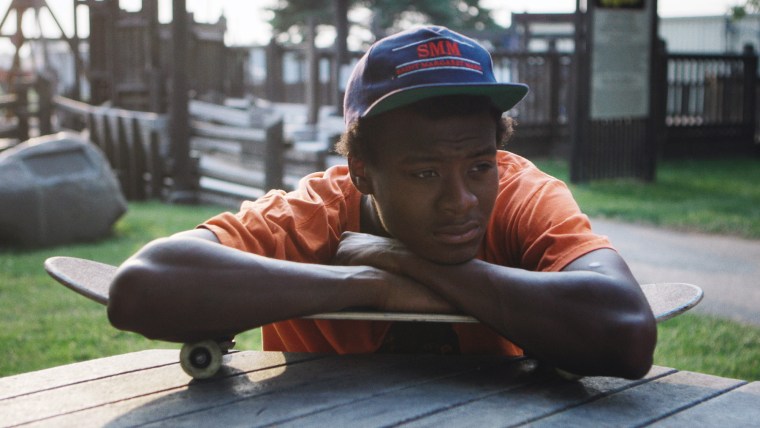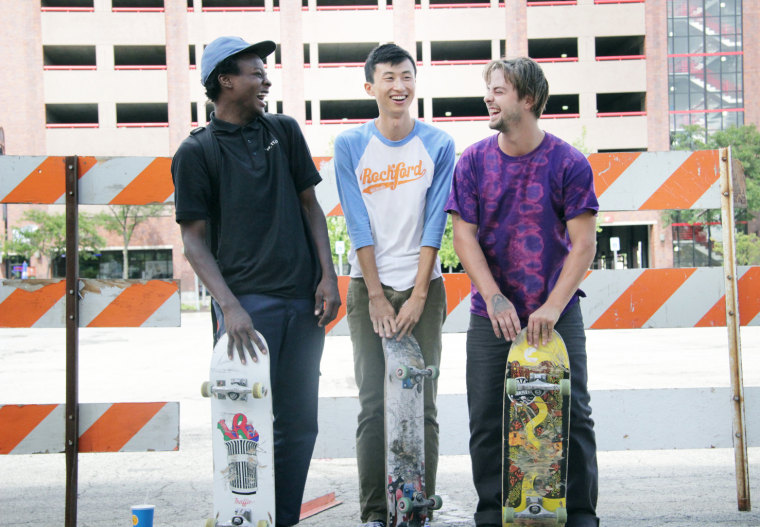In the opening scene of the Oscar-nominated documentary “Minding the Gap,” two young men are carrying skateboards and climbing a rickety fire escape while ignoring a "no trespassing" sign. The men, Keire Johnson and Zack Mulligan, rib each other about being scared before finally deciding to turn around and climb down.
"Your whole life, society tells you, 'Be a man, you're strong and you're tough,'" Mulligan says in the next scene, wondering aloud how and when boys internalize this message.
That question runs through the documentary as director Bing Liu explores masculinity, domestic violence and race — all through the lens of skateboarding — in his hometown of Rockford, Illinois.
“I was trying to get at the causes of violence, to tackle it that way. Most of media shows you the effect,” Liu, 30, told NBC News. “I wanted to look at why violence is rationalized. How it’s perpetuated. How it is not something that’s easy to tackle. How it has to do with emotions and the way we deal with emotions and the way we don’t deal with them.”
"Minding the Gap," which premiered at Sundance in 2018 and took home the U.S. Documentary Special Jury Award for Breakthrough Filmmaking, was released by Hulu last August. It's been nominated for an Academy Award this year for Best Documentary Feature.
The film unfolds with scenes of carefree young men, including Johnson and Mulligan, skateboarding through empty parking garages, over bridges and in busy commercial areas. These scenes are contrasted with those of Mulligan becoming a father at 23 and Johnson, 18, getting a job to help his family pay bills.
“We have to fully grow up and it’s gonna f---ing suck,” Mulligan says in the film.
The documentary compiles over 12 years of footage, which includes scenes of Liu at 17, as a skateboarding Chinese-American teen with braces. Liu said he, Johnson and Mulligan knew one another from the skateboarding scene in Rockford, but they weren't close. Liu said he was 17 when he started filming Mulligan, who was 15 at the time. He and Johnson have a wider age gap — eight years — and Liu said their main interaction before the documentary was some initial footage shot when he was 19 and Johnson was 11.
The primary thing Liu found the three men shared was how skateboarding offered a sense of family they didn’t feel they had, as well as an escape from their home lives and experiences with domestic violence that shaped much of their childhood.
In the film, Liu confronts his mother about his stepfather's physical abuse of both of them. And while the emotional — and sometimes tense — conversation didn't delve into issues of race and identity, Liu said he tried to open up the conversation.
"We tried to talk about ways my stepfather used racism to emotionally abuse us," he said.
Liu and his mother were both born in China and immigrated to the U.S. when he was 5 years old. He said his mother stayed with his stepfather, who is white and met Liu’s mother at her pizza parlor job, in part because her American dream was to have a traditional family. Citizenship, he said, was also a factor.
“I witnessed him dismiss my Chinese-ness and Asian-ness and internalized the racism, slowly realizing that no matter how much you try to control your identity, your race matters," Liu said of his stepfather
He added that while he and his two subjects had experienced abuse, the fuller picture was about feeling alienated in many arenas of life. In the film, Johnson becomes emotional several times as he tries to reconcile his father's alleged abuse, while trying to understand the ways he also looked out for him.
“Growing up, my dad would always tell me, ‘Keire, you have a lot of white friends but don’t forget that you’re black,'" Johnson says in the film of his father, who died in 2011.
The film depicts Johnson as one of the only black kids in a group of mostly white friends. Scenes play out with Johnson sitting among white peers discussing whether they really have privilege if they are poor and laughing at a viral video that repeats the N-word.
Johnson appears a bit ostracized, both socially and at home.
“I always felt like I didn’t fit in with my family,” he says in the film. “It seemed like they don’t understand why I skateboarded in the first place.”
Liu said that he identifies with Johnson. “I felt that, too. I don’t feel normal at home and I don’t feel completely normal with my friends," Liu told NBC News.

As a director, Liu acknowledged the role race played in not only the documentary but in his own story, adding that his goal at the end of the day was to talk about the Asian-American experience in a larger context.
“Oftentimes these stories are told in a vacuum that’s very hyperconcentrated in a time or place or community that’s almost dismissive of what’s going on in larger America,” he said. “The Asian-American experience is very much part and parcel to other communities.”
The director said he also saw his own mother in the story of Mulligan and his girlfriend, Nina, as they struggled with having to grow up quickly after having a child while also grappling with alleged abuse.
“I saw my mom in her, and all they wanted was to create this family unit,” Liu said of Nina and Mulligan. “I sort of knew why things kept going because I lived in a house like this.”
Liu said that in telling a story about masculinity, the film also undeniably advocates for women, though he added that he doesn’t feel he has the right to call it a feminist film. Liu said the aim was to call out structural issues, despite individual choices.
"Men are more privileged. We have more power. That definitely was in my mind," he said. "I was thinking about my ethical decision as a filmmaker."
Follow NBC Asian America on Facebook, Twitter, Instagram and Tumblr.
